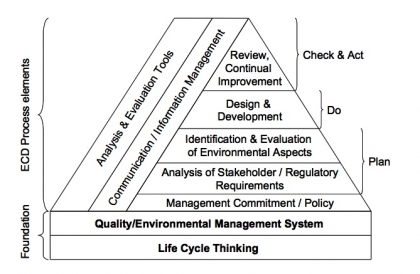
One of the general criticisms about standards is that they are almost always out of date - those leading technical innovation are usually guessing where things are going and hoping they make the right bet.
Given the increasing awareness and focus on sustainability and on minimizing the overall environmental impact of products across their entire life cycle, is there a useful role for standards?
The folks involved with the creation of the International Electrotechnical Commission's draft standard for Environmentally Conscious Design (ECD) for
Electrical and Electronic Products and Systems (IEC 62430) would answer, "absolutely!"
The new standard, which was released in draft form for final review March 21st (the review period ends September 5th) was initiated by the delegation from Japan, but developed with the participation of technical experts from 26 additional countries.
In a nutshell, the standard promotes "life cycle thinking" (LCT), which is defined as the "consideration of all relevant environmental aspects during the entire life cycle of products and systems." The key elements of LCT are: